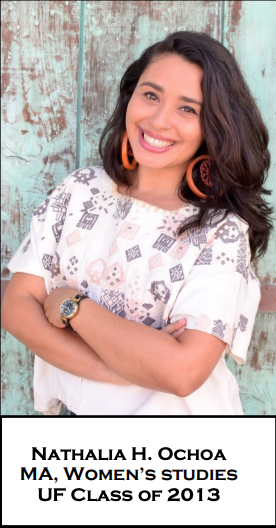Center Alum Advances Research and Praxis Centering Indigenous Women’s Resistance and Liberation Activism
 Nathalia H. Ochoa graduated with the MA in Women’s Studies in 2013. She is currently a doctoral candidate in the Teresa Lozano Long Institute of Latin American Studies (LLILAS) at the University of Texas-Austin. As a feminist scholar, her work focuses on intersectional analysis of violence against women in Central America, Maya Kaqchikel women’s activism through theater and performance, and decolonial theory and praxis from the perspective of indigenous women in the Americas. She is currently in Guatemala conducting ethnographic work for her dissertation.
Nathalia H. Ochoa graduated with the MA in Women’s Studies in 2013. She is currently a doctoral candidate in the Teresa Lozano Long Institute of Latin American Studies (LLILAS) at the University of Texas-Austin. As a feminist scholar, her work focuses on intersectional analysis of violence against women in Central America, Maya Kaqchikel women’s activism through theater and performance, and decolonial theory and praxis from the perspective of indigenous women in the Americas. She is currently in Guatemala conducting ethnographic work for her dissertation.
My grandmother, Alicia, had a third grade education, and my mother, Patricia, holds a high school diploma from El Salvador. Alicia and Patricia had a pupuseria1 which was the main income generator for my family. I grew up in San Salvador, El Salvador and moved to the United States when I was seventeen years old. Even though I have had the privilege to pursue higher education in this country, I also have experienced the immigrant conditions of economic hardship, isolation and discrimination. I am a first generation college student who often felt guilty for pursuing an education in Gender and Women’s Studies instead of finding a well-paying job or a “more practical” career. To this date, I have no regrets about my decision, and here is why:
“Estudios de género y feminismos, y eso para qué sirve?”—what is an MA in women’s studies good for? -my mother asked.
Feminism has brought purpose to my life which means, my daily actions, academic work and community engagement often intersect, in my case, to understand how and why violence against women is so prominent across the Americas. The MA in Women’s Studies provided me with a strong foundation on feminist theory, methodologies and frameworks that have guided my academic and professional development. Feminism is not only about “women” like many people think. It is about power relations and structural inequalities often shaped by race, class, gender, sexuality, nationality, ethnicity, and religion (among others). These forms of oppression interact with one another in ways that mark certain bodies more vulnerable to violence, exploitation and even extermination.
For my MA project, I collected oral histories of peasant women who were part of the FMLN (Farabundo Martí Liberation Front) during the Salvadoran revolution in the 1980s. I learned how despite the multiple forms of violence these women faced, they still found ways to become leaders and activist to create a better world for themselves and their communities. From this experience, I became more interested in understanding violence against women in Latin America. Central America, my home, has the highest rates of gender-based sexual violence against women and feminicide.
I am a PhD candidate at the University of Texas-Austin pursuing a degree in Latin American Studies and Anthropology. I am currently living in Guatemala learning the Maya Kaqchikel language and conducting research for my dissertation project titled “Curanderas: Maya Women Resisting Violence through Theater and Performance.” In this project, I am collaborating with different Maya Kaqchikel women’s groups to better understand how they are using theater and performance as: (1) a tool to explore their own subjectivities, (2) disrupt violent narratives of historical colonialism, (3) denounce gender-based violence, and (4) imagine liberatory futures guided by their own concepts of healing, justice, and community feminisms.
I am grateful to the Center for Gender, Sexualities, and Women’s Studies Research (CGSWSR), their staff, faculty and former students who inspired my academic searches and showed me “what a feminist looks like.” May we all continue to live in purpose, support one another, and free ourselves from all forms of oppression.
